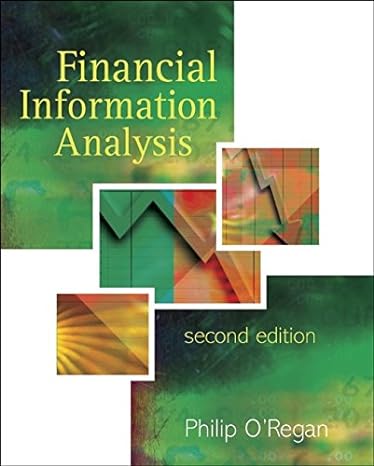Answered step by step
Verified Expert Solution
Question
1 Approved Answer
ICE Drilling Inc.'s balance sheet information and income statement are as follows: ICE Drilling Inc. Income Statement For Year Ended December 31, 2020 Sales Cost
ICE Drilling Inc.'s balance sheet information and income statement are as follows: ICE Drilling Inc. Income Statement For Year Ended December 31, 2020 Sales Cost of goods sold Gross profit Operating expenses: Depreciation expense Other expenses Total operating expenses Profit from operations Loss on sale of equipment Profit before taxes Income taxes Profit $1,112,400 564,000 $ 548,400 $ 46,000 306,560 ICE Drilling Inc. Comparative Balance Sheet Information 352,560 $ 195,840 12,280 $ 183,560 27,960 $ 155,600 December 31 2020 2019 Cash $ 124,680 $ 175,640 Accounts receivable 149,600 115,160 Merchandise inventory 617,200 569,600 Prepaid expenses 12,080 18,000 Equipment 358,080 250,400 Accumulated depreciation 81,560 102,560 Accounts payable 194,240 254,040 Current notes payable 26,400 18,000 Notes payable 210,000 121,200 Common shares 454,800 354,000 Retained earnings 294,640 279,000 Additional information regarding ICE Drilling's activities during 2020: 1. Loss on sale of equipment is $12,280. 2. Paid $71,080 to reduce a long-term note payable. 3. Equipment costing $109,000, with accumulated depreciation of $67,000, is sold for cash. 4. Equipment costing $216,680 is purchased by paying cash of $56,800 and signing a long-term note payable for the balance. 5. Borrowed $8,400 by signing a short-term note payable. 6. Issued 10,080 common shares for cash at $10 per share. 7. Declared and paid cash dividends of $139,960. Required: Prepare a statement of cash flows for 2020 that reports the cash inflows and outflows from operating activities according to the Indirect method. (List any deduction in cash and cash outflows as negative amounts.) ICE DRILLING INC. Statement of Cash Flows For Year Ended December 31, 2020 Cash flows from operating activities: Adjustments to reconcile profit to net cash inflows from operating activities: Cash flows from investing activities: Cash flows from investing activities: Cash flows from financing activities: Analysis Component: Merchandise Inventory, Prepaid Expenses, Notes Payable, and Common Shares are some of the accounts that changed during 2020. Indicate what transactions likely caused each of these accounts to increase and/or decrease. (You may select more than one answer. Single click the box with the question mark to produce a check mark for a correct answer and double click the box with the question mark to empty the box for a wrong answer.) Merchandise inventory: Increases caused by the purchase of merchandise ? decreases caused by the purchase of merchandise decreases caused by the sale of merchandise increases caused by the sale of merchandise Prepaid expenses: increases caused by the purchase of prepaid items, I.e., such as the payment of rent or Insurance in advance decreases caused by the use of prepaid expenses decreases caused by the purchase of prepaid items, le, such as the payment of rent or insurance in advance increases caused by the use of prepaid expenses Notes payable: ? increases caused by the issuance of debt (borrowing) ? decreases caused by principal payments ? decreases caused by the issuance of debt (borrowing) ? Increases caused by principal payments Common shares: ? Increases caused by the issuance of shares and/or share dividends ? decreases caused by the repurchase and/or cancellation of shares ? decreases caused by the issuance of shares and/or share dividends ? Increases caused by the repurchase and/or cancellation of shares
Step by Step Solution
There are 3 Steps involved in it
Step: 1

Get Instant Access to Expert-Tailored Solutions
See step-by-step solutions with expert insights and AI powered tools for academic success
Step: 2

Step: 3

Ace Your Homework with AI
Get the answers you need in no time with our AI-driven, step-by-step assistance
Get Started


